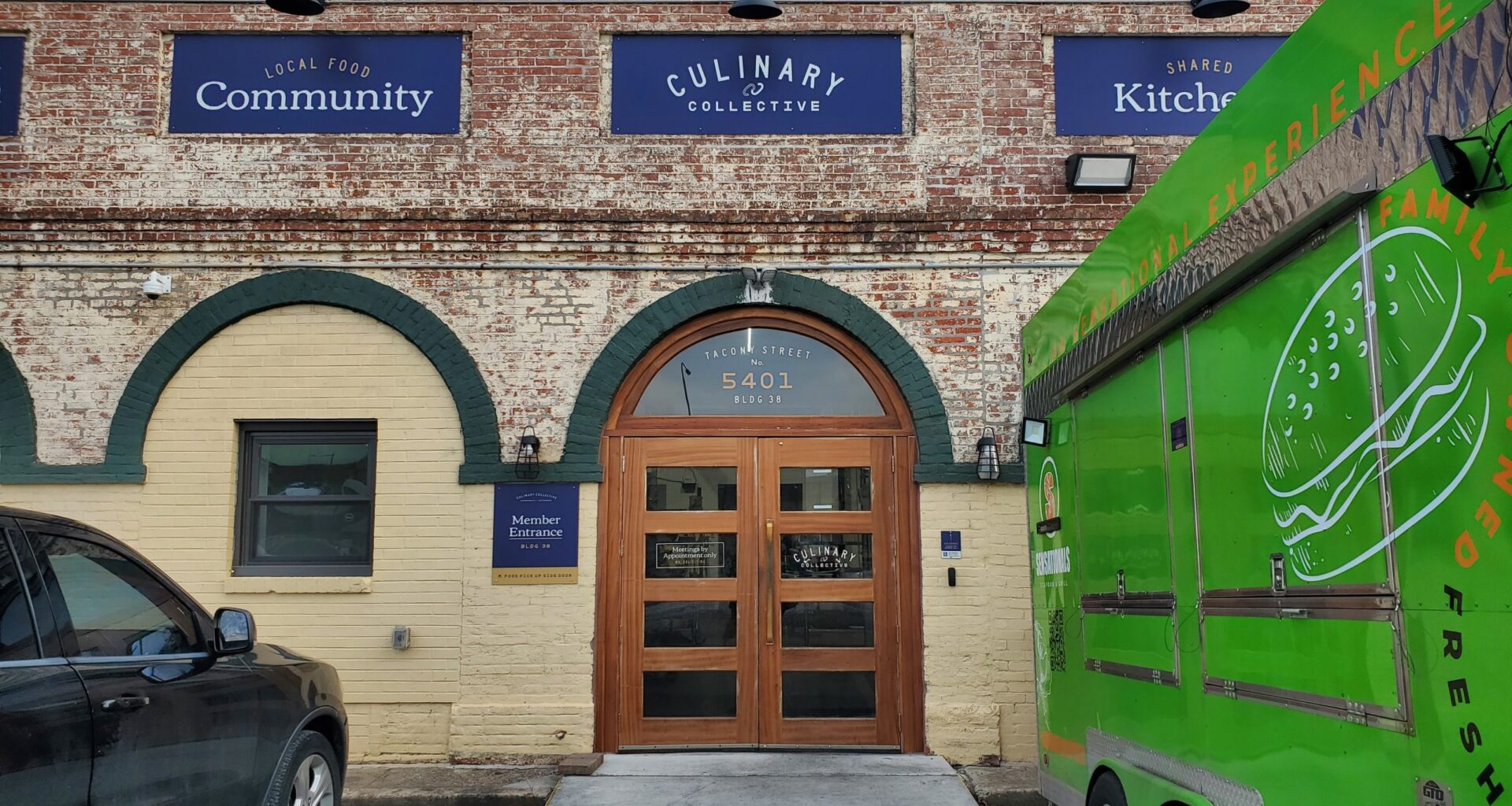On an ordinary Wednesday afternoon, these two Philly buildings host many cooks. Aromas from around the world float through the air, mingling with the sounds of grilling, frying, mixing, trays being passed around and washing dishes.
Some of the cooks are caterers. Some are bakers. Some own food trucks. Others prepare packaged goods. And some run pop-up restaurants. Each of them is cooking something different — carrot cakes, macarons, venison with macaroni and cheese, tres leches, empanadas, cake pops, frozen halal food — you name it! But they all have something in common: they are part of Culinary Collective, a family-owned coworking commercial kitchen space in the Frankford Arsenal.
“What the space is like here on a daily basis is a community. It’s a family of businesses and people that all work together,” said Brandon Weizer, who co-founded the space in 2021 with his parents Craig and Robin.
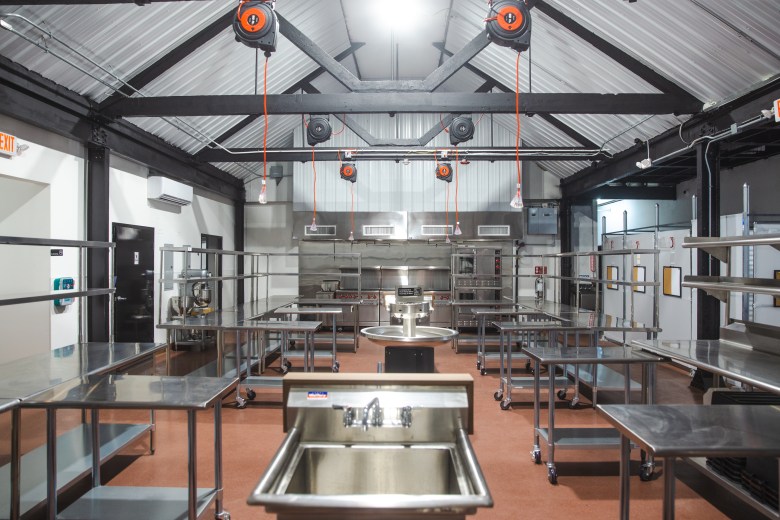 Culinary Collective started a new concept of private and coworking commercial kitchen spaces in the Frankford Arsenal. (Photo courtesy of Neal Santos)
Culinary Collective started a new concept of private and coworking commercial kitchen spaces in the Frankford Arsenal. (Photo courtesy of Neal Santos)
Back in 2012, the family operated a kitchen called Bridesburg Commissary. The idea came about when Craig set out to open and manage storage facilities but started receiving some calls. “From people that either had food trucks or were vendors in the city needing a place to park their vehicles, possibly plug them in and clean them, and these calls got more frequent,” Craig recalled.
“They told me that they needed what was called a commissary. At the time I didn’t even I didn’t know what a commissary was.”
But in just a few months, they built the facility and quickly became one of the most successful kitchen commissaries in the city, as Billy Penn previously reported.
It was a time in Philly when food trucks were gaining popularity and, with that growth came more regulations. “The city of Philadelphia changed some guidelines with regards to how they govern food trucks and required a quote-unquote ‘support facility’ or ‘commissary’ for them to operate from. And there just weren’t many in the city at the time,” said Brandon. Regulations were also put in place expanding and regulating where food trucks could operate, allowing the industry to continue growing.
“Within about, I’ll say, a year and a half, [our] two buildings were filled with people that were food entrepreneurs. It happened very quickly … And then Brandon joined probably five or six years ago,” said Craig.
An industry in flux
By the time Brandon came on board, the industry was shifting. “When I stepped into the fold, the scene in the city started to change … We started seeing more catering, more bakers needing space, more private chefs and personal chefs coming in need of space and consumer packaged-goods brands needing areas to produce their product,” said Brandon.
The family business adapted once again to meet the evolving needs of the industry. When they received an opportunity to relocate to the Frankford Arsenal, they took it. They rebranded as Culinary Collective and changed their concept “to focus more on supplying kitchen space and opportunities for a wider range of businesses,” said Brandon.
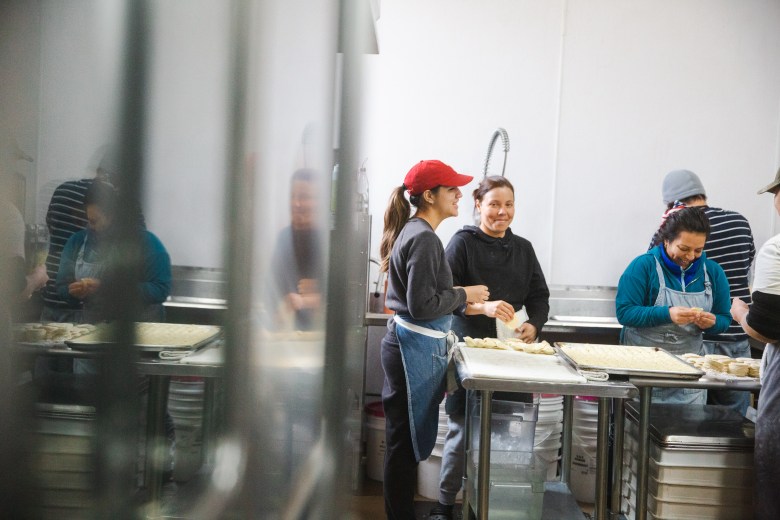 Culinary Collective started a new concept of private and coworking commercial kitchen spaces in the Frankford Arsenal. (Photo courtesy of Neal Santos)
Culinary Collective started a new concept of private and coworking commercial kitchen spaces in the Frankford Arsenal. (Photo courtesy of Neal Santos)
Now the space is much more than a place for food trucks to park, plug in and clean. They own two buildings at the Frankford Arsenal, which comprise 21 coworking kitchen spaces, four cook pods, and five private kitchens. Aside from a one-time administrative fee for food truck sign-ups, all memberships operate on a monthly payment structure. The most affordable option, the hourly kitchen model, requires a $250 security deposit and a $250 monthly fee, with additional hours billed at $25 per hour. The full-time shared kitchen option is $1,750 per month, with a security deposit equal to that amount.
There are five tiers of membership options available.
The first is a basic package for food trucks that need occasional kitchen access but require parking, cleaning and waste disposal services.
The second is an hourly kitchen model, where businesses bring their own tools and rent a private kitchen space as needed.
The third option is shared kitchen spaces, which include a dedicated prep table, lockable dry storage and access to walk-in refrigerators and freezers.
The fourth tier consists of cook pods — open kitchen stations with dedicated cooking equipment like stoves, ovens and deep fryers.
Finally, the fifth option offers fully equipped private kitchens, providing complete independence while still allowing members to engage with the community.
‘A melting pot and I love it’
“We’ve built a community, a commercial kitchen with a whole lot of cooks in it,” said Brandon. “We’re able to support in our two buildings now approximately 30 full-time businesses, another dozen hourly businesses that come in and use the kitchen hourly and another like 40 food trucks that use the kitchen sporadically.”
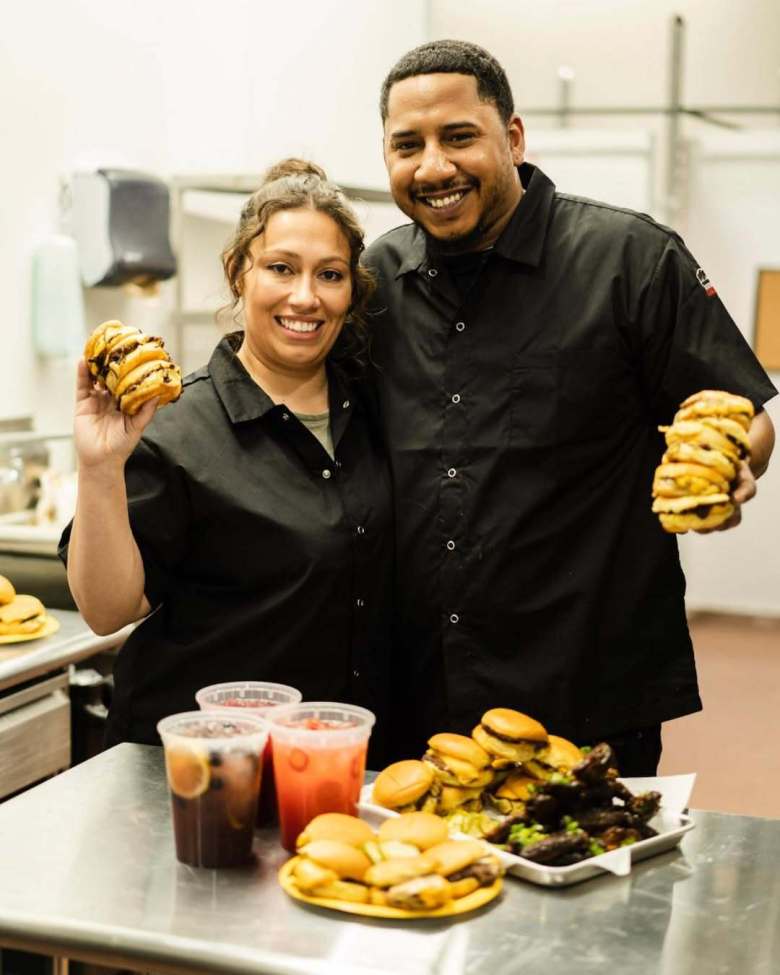 Cassandra Ortiz and Ryan Edwards started Happy Bites inspired by their favorite bar foods, adding a special twist while keeping the prices affordable. (Photo courtesy of PJ Agbay)
Cassandra Ortiz and Ryan Edwards started Happy Bites inspired by their favorite bar foods, adding a special twist while keeping the prices affordable. (Photo courtesy of PJ Agbay)
“It’s pretty much like a melting pot and I love it. You’ve got everything from desserts to spices … And then top-of-the-line catering companies. It’s awesome. It’s inspiring, to be honest,” shared Cassandra Ortiz, co-owner of the pop-up restaurant and catering company Happy Bites.
“We came up with a concept of bar-foodie-type things, like burgers, smash burgers, sliders, wings … We want to be approachable to families, so we try to keep our food affordable as well,” said Ortiz, talking about what she and her fiancé Ryan Edwards had in mind when they designed their business in 2022.
They chose to establish Happy Bites through the Culinary Collective because it provided more than just space to cook. It offered valuable connections and guidance. “They’re actually the ones who gave us our first pop-up at Bottle Bar East, which was our opening day, on Memorial Day weekend. And it was crazy,” added Ortiz. “That pretty much kick-started us and gave us the knowledge, because we didn’t know the industry.”
Their business has fluctuated over the years, along with their space needs. They started in one of the cook pods, then moved into a private kitchen, and later transitioned to an hourly space, because they were offered a residency at Punch Buggy Brewing Company, where they currently have their own kitchen space.
“We’ve pretty much tried all the pots in the kitchen. And they’ve worked with us. They know that our business was changing … If it’s available, they’re always working with us,” said Ortiz.
Another way Culinary Collective adapts to the needs of each business is through its scale-up program, designed for new businesses looking to become full-time members. The program offers access to a full-time shared kitchen with a dedicated prep station, as well as cold, dry and freezer storage, at half price for the first three months. During this period, the monthly fee is $875, with gradual price increases until the sixth month, when it reaches the full rate of $1,750 per month.
“The whole goal is for everyone to be successful,” said Brandon. “We want to take a little bit of that burden off for your first 90 days, so you can get your feet wet, get your processes together, feel comfortable.”
A success story
One of the businesses that has benefited from this program — and one of the newest members of the Collective — is the Peruvian pop-up restaurant Mucho Peru, founded by husband and wife Aldo Bando and Brizna Rojas. They began working in catering over 24 years ago in Peru, providing sweets to popular restaurants in Lima. However, after experiencing some violent threats common back in Lima, they decided to relocate to the United States in 2016.
“It’s difficult to start from scratch, honestly. With the language barrier, the cultural shock,” said Bando. They arrived with their three children and shortly started working in restaurants. They spent years gaining experience before deciding to start their own business in late 2024.
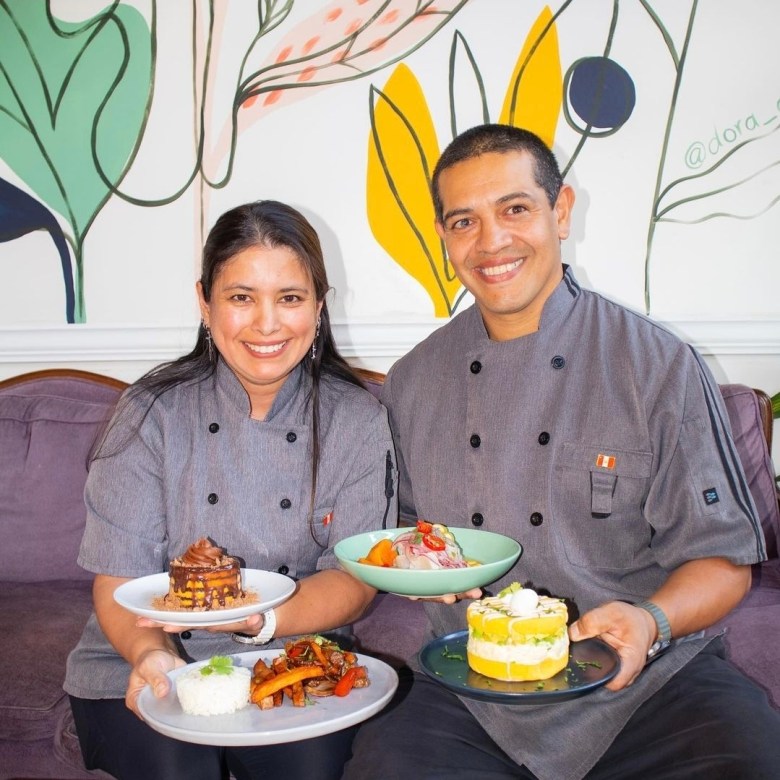 Brizna Rojas and Aldo Bando started their culinary journey back in their home country, Peru. Now they are part of Culinary Collective and bring Peruvian flavors to the Philly cuisine scene. (Photo courtesy of Culinary Collective)
Brizna Rojas and Aldo Bando started their culinary journey back in their home country, Peru. Now they are part of Culinary Collective and bring Peruvian flavors to the Philly cuisine scene. (Photo courtesy of Culinary Collective)
At first, they rented a commercial kitchen by the hour, but as their pop-up events at bars began to do really well, they had to reassess. “We thought it was better to pay by the hour because we figured we could get everything done in five hours and that would be it. We weren’t prepared for the volume we were about to start selling,” said Rojas.
They had heard of Culinary Collective before, but it wasn’t until then that they felt ready to reach out. They scheduled a meeting with Brandon, who offered them the scale-up program. After checking out the spaces, they decided to join, but waited until January to move in.
“It’s three months — January, February and March — which are the toughest months … It’s helping us save money to buy equipment, continue working and do other things. It really is a great help,” said Rojas. The couple appreciated the Collective’s flexibility in allowing them to wait for their move-in. “You don’t just value it financially … Here [in the U.S.], business is business. Other places tell you, ‘It costs this much, and if you can’t pay, good-bye,’ ” said Bando.
Mucho Peru offers Peruvian bites, like empanadas and alfajores, as well as Peruvian twists on classics like wings and burgers. They continue to grow and have just announced their residency at Fat Lady Brewing for the month of March.
Community is a core value for the members of Culinary Collective. “They share resources, they share leads, they share pallets. Literally the old adage of borrowing a cup of sugar from your neighbor happens here every single day on a daily basis. That’s really what it is,” said Brandon. At the time of the conversation with Billy Penn, the owners mentioned that they only had four shared kitchen spaces available.
Growth of each business is something that happens both within the buildings at the Frankford Arsenal and beyond their walls. “What we really wanted to do is create sort of an all-encompassing environment or facility where you can scale from just hourly into shared, into a cook pot, into a private kitchen based on your needs and then potentially out into your own space depending on what your goals are,” added Brandon.
